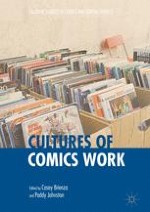2016 | OriginalPaper | Buchkapitel
13. To the Studio! Comic Book Artists: The Next Generation and the Occupational Imaginary of Comics Work
Aktivieren Sie unsere intelligente Suche, um passende Fachinhalte oder Patente zu finden.
Wählen Sie Textabschnitte aus um mit Künstlicher Intelligenz passenden Patente zu finden. powered by
Markieren Sie Textabschnitte, um KI-gestützt weitere passende Inhalte zu finden. powered by
